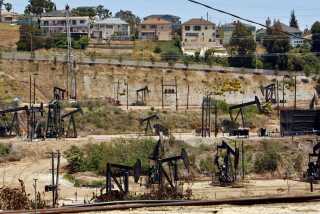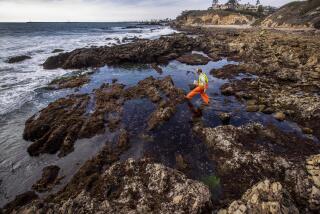Gulf spill oil well investor to pay record fine
A minority investor in the failed Macondo well in the Gulf of Mexico has agreed to pay $90 million in civil penalties and other fees related to the 2010 oil spill, the first settlement before an upcoming major trial linked to the disaster.
The Obama administration touted the settlement with MOEX Offshore 2007, a subsidiary of the Japanese firm Mitsui & Co., as the largest penalty ever paid for violating the Clean Water Act.
“This landmark settlement is an important step — but only a first step — toward achieving accountability and protecting the future of the gulf ecosystem by funding critical habitat preservation projects,” Atty. Gen. Eric H. Holder Jr. said.
But independent analysts offered mixed reviews of the settlement and its implications for possible penalties against the major companies involved the disaster, including BP, the well operator; and Transocean Ltd., which owned the Deepwater Horizon drilling rig that exploded as a result of the well blowout.
“There’s a limit to how much the MOEX settlement tells us about what may happen with BP and other companies involved in the spill, but it certainly signals the government is not going to seek anything approaching the maximum penalties against the other defendants,” said David Uhlmann, director of the environmental law program at the University of Michigan and former head of the Justice Department’s environmental crimes section. “There’s no escaping the conclusion that this is an extremely small penalty in the context of the gulf oil spill.”
Opening arguments begin Feb. 27 in New Orleans in the civil lawsuit brought against BP and other companies by the Justice Department and thousands of gulf-area residents who say they were hurt by the oil spill.
MOEX was the smallest shareholder in the project and a passive partner that had no role in the drilling operation that was underway when the Macondo well blew out, killing 11 workers on the Deepwater Horizon rig and spewing nearly 5 million barrels of oil into the sea. Under the terms of the settlement, MOEX would pay $70 million in penalties and $20 million for preservation and land acquisition projects in several Gulf Coast states.
Several legal and environmental experts raised concerns that MOEX’s payments did not seem to reflect the magnitude of the spill.
Richard Steiner, a retired professor of marine conservation at the University of Alaska, said that the Justice Department may be focusing its efforts on BP instead. It “may be trying to get the small fish out of the way, so they can land the big one — BP — later this month,” he said.
“And, a settlement is almost always better for the injured environment than protracted litigation. For instance, the Exxon Valdez litigation is still ongoing, after 23 years,” he added.
David Pettit, a lawyer with the Natural Resources Defense Council, said that the consent decree between the government and MOEX did not preclude collecting more money from the company once the authorities complete a natural resources damage assessment.
Some environmentalists also questioned where the $70 million in penalties was going. About $45 million will be used to replenish the Oil Spill Liability Trust Fund as compensation for government efforts to manage the spill. The remaining $25 million will be distributed among the gulf states of Texas, Louisiana, Mississippi, Alabama and Florida.
More to Read
Start your day right
Sign up for Essential California for news, features and recommendations from the L.A. Times and beyond in your inbox six days a week.
You may occasionally receive promotional content from the Los Angeles Times.







